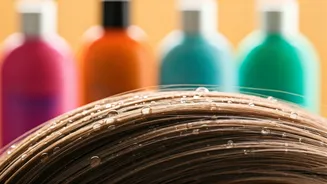Understanding Hair Fall
Hair fall is a widespread concern, often stemming from various factors such as stress, diet, genetics, and environmental conditions. Understanding the
root causes of hair fall is the first step toward finding effective solutions. Several factors contribute to this issue, including nutritional deficiencies, hormonal imbalances, and the use of harsh hair products. Identifying these underlying causes allows individuals to make informed choices about their hair care routine. Implementing strategies that include a balanced diet rich in essential nutrients, reducing stress levels, and using hair products specifically formulated to address hair fall, can contribute significantly to better hair health. Furthermore, consulting with a dermatologist can help in diagnosing specific causes and provide tailored solutions to combat hair fall effectively. Embracing a holistic approach that considers both internal and external factors is crucial for managing and reducing hair fall.
Key Conditioner Ingredients
Choosing the right conditioner with the proper ingredients is essential to effectively combat hair fall. Key ingredients often include biotin, which helps to strengthen hair and promote growth. Additionally, products containing keratin can repair damage and add strength, while caffeine is known to stimulate hair follicles. Other beneficial ingredients include various vitamins and natural extracts like aloe vera, which soothes the scalp and promotes moisture retention. When selecting a conditioner, it's wise to consider the specific needs of your hair type. For example, those with dry hair may benefit from conditioners rich in moisturizing oils, whereas those with oily hair might prefer formulas that provide lightweight hydration without weighing the hair down. Carefully reading labels and understanding the function of each ingredient can help one make a well-informed decision that supports their hair health goals.
Product Selection Criteria
Selecting the best anti-hair fall conditioner requires careful evaluation of several criteria. Firstly, consider the product's formulation, ensuring it's free from harsh chemicals like sulfates and parabens, which can strip the hair of its natural oils and worsen hair fall. Read the product reviews. Look for conditioners with positive feedback regarding hair strengthening, reduction of hair fall, and improved hair texture. Another vital factor is the product’s suitability for your hair type, whether it's dry, oily, or a combination. The conditioner should effectively target your specific hair concerns. Check the brand reputation. Popular brands with a proven track record of quality and effectiveness often produce reliable products. Lastly, consider the ease of use and overall experience, ensuring the conditioner is easy to apply, rinses out well, and leaves your hair feeling refreshed and manageable. These elements, combined, will aid in choosing the perfect conditioner.
Strengthening Your Hair
Conditioners designed to strengthen hair often contain ingredients that fortify hair shafts and reduce breakage. Proteins, such as keratin and collagen, are essential components, repairing damage and reinforcing the hair's structure. These conditioners work by penetrating the hair's outer layer, filling gaps and smoothing the surface, thereby reducing friction and breakage. Additionally, ingredients like vitamins B5 and E provide essential nutrients that promote overall hair health, contributing to improved elasticity and resilience. Regular use of these conditioners can significantly reduce hair fall by making the hair more resistant to daily stressors, such as styling and environmental damage. The ultimate goal is to increase the hair's natural strength, which helps it remain firmly anchored in the scalp and less prone to falling out. Thus, incorporating a strengthening conditioner into your hair care routine is crucial for anyone looking to mitigate hair fall.
Nourishing Your Hair
Nourishing conditioners are packed with elements that provide essential nutrients and hydration to the hair and scalp, which are both critical for overall hair health. These products often include natural oils such as argan, coconut, and jojoba oil, which deeply moisturize the hair, reducing dryness and enhancing manageability. Vitamins and antioxidants, like vitamin E and green tea extract, protect the hair from environmental damage. Many nourishing conditioners also contain essential fatty acids, contributing to healthier hair follicles. These nutrients work to replenish the hair's natural oils, improving its overall texture and shine. Regular use ensures that the hair receives the necessary elements to maintain optimal health, leading to decreased hair fall and an improved, more radiant appearance. Choosing a conditioner rich in these nourishing ingredients supports hair health from the inside out.
Adding Shine & Vitality
Conditioners designed to add shine and vitality typically contain ingredients that smooth the hair cuticle, reflecting light and boosting the hair's natural luster. These products often include silicones, which create a smooth surface, reducing frizz and adding gloss. Other beneficial ingredients are lightweight oils, such as camellia oil and grape seed oil, which add shine without weighing the hair down. The antioxidants and vitamins present in these conditioners also contribute to the hair's overall health and vibrancy. When choosing a conditioner to enhance shine, it’s also important to consider the hair type, as some formulas may be more suitable for certain textures than others. By consistently using these conditioners, users can expect to see an immediate improvement in the hair’s appearance, with a vibrant, healthy shine. This also contributes to overall hair health and reduces the appearance of dullness.
Application Techniques
Proper application techniques are essential to maximize the effectiveness of anti-hair fall conditioners. Start by shampooing your hair thoroughly to remove dirt and product buildup, ensuring the conditioner can penetrate the hair shafts. Apply the conditioner evenly, focusing on the mid-lengths and ends of your hair, where hair tends to be driest and most damaged. Avoid applying the conditioner directly to your scalp, especially if you have oily hair, as this can lead to buildup and clog follicles. Use a wide-tooth comb to distribute the product evenly, ensuring every strand is coated. Allow the conditioner to sit for the recommended time, usually 2–3 minutes, to allow the ingredients to penetrate. Rinse thoroughly with cool or lukewarm water. By following these steps, you can ensure that your conditioner works as effectively as possible, promoting healthier, stronger hair and reducing hair fall.
Complementary Hair Care
To optimize the results of your anti-hair fall conditioner, it's wise to integrate several complementary hair care practices into your routine. This starts with using a gentle, sulfate-free shampoo to cleanse your hair without stripping away essential oils. Following up with a nourishing hair mask once or twice a week provides an extra dose of hydration and nutrients. Minimize the use of heat styling tools, such as hair dryers, straighteners, and curling irons, as these can damage the hair and contribute to hair fall. Protect your hair from sun exposure with hats or leave-in products containing UV filters. Eating a balanced diet rich in vitamins, minerals, and proteins is also very important for overall hair health. Drinking plenty of water helps to keep your scalp and hair hydrated. By implementing these practices, you can enhance the effects of your anti-hair fall conditioner and promote healthier, stronger hair.


















